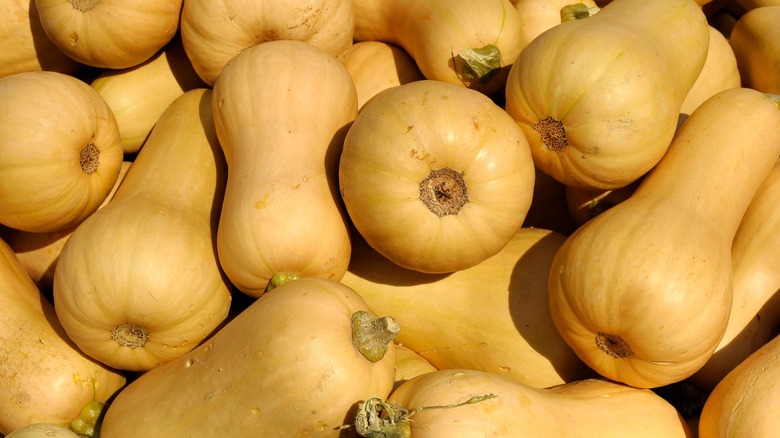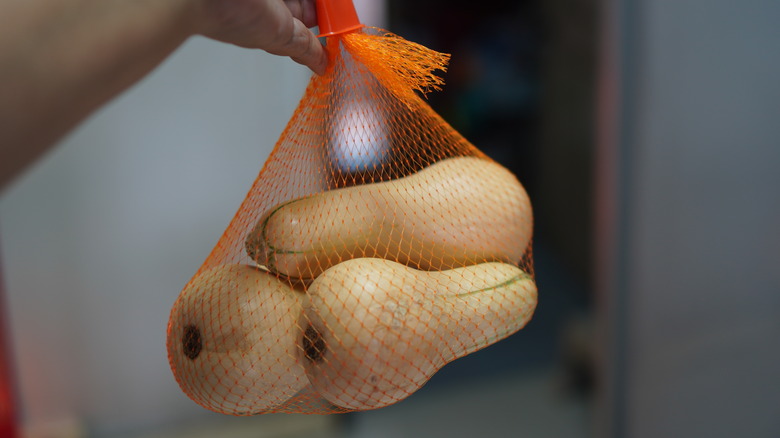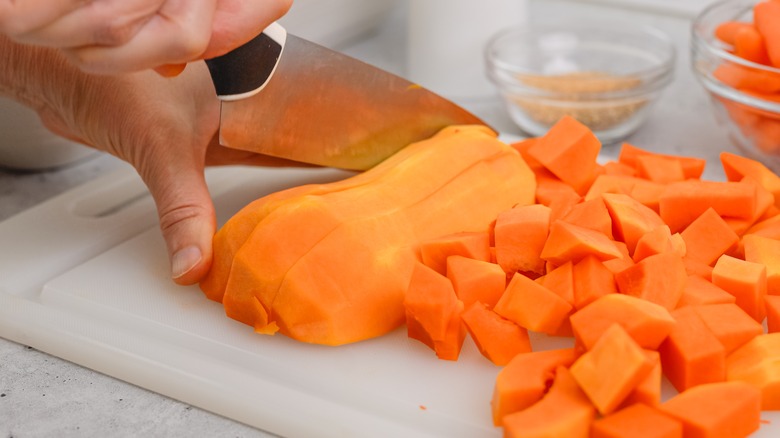Why You Should Never Store Butternut Squash In The Fridge
The refrigerator is a fine place to keep endless types of foods fresh. From carrots and broccoli to tomatoes and green beans, the cold ice box can dramatically increase the shelf life of your produce while also helping maintain its taste and nutritional value. But for other fruits and veggies, the fridge can actually have the complete opposite effect. This is the case for whole butternut squash.
Known for its light orange exterior and bright orange flesh, butternut squash is a long, pear-shaped fruit that's commonly considered and treated as a vegetable. Its flavor profile can be described as mildly sweet and nutty, which can lend itself well to recipes such as a classic roasted butternut squash soup or an even more complex Thai-inspired coconut and pumpkin soup. These delicious characteristics won't hold up well in a fridge, though. That's true for uncut, unpeeled butternut squash, at least. The life span of whole butternut squash will be shortened if placed in the fridge, as the chilly temperature and humidity can negatively affect its texture and hasten its spoilage.
How to properly store whole butternut squash
While whole butternut squash can spoil quickly in the low temperatures of the refrigerator, the fruit still requires an overall cool environment. Between 50℉ to 60℉ is ideal for any type of winter squash. It should also be a dry and dark place, which makes the pantry or cellar the perfect location to keep this produce. A cabinet away from the oven, sunlight, or any direct heat will also do just fine.
You'll also want to be mindful of the other types of food your butternut squash is surrounded by. In particular, keep your squash away from most other fruits. Fruits give off a lot of ethylene, a natural, colorless gas that causes produce to ripen faster. Squash is very sensitive to this gas, and when stored side by side with strong ethylene producers like tomatoes, apples, or bananas, you're likely to get some prematurely rotten food on your hands. But if kept in the appropriate conditions away from excessive amounts of the gas, your whole butternut squash can last up to a solid two months.
Where to keep cut-up butternut squash
Whole butternut squash should never be stored in the fridge, but that rule doesn't apply to peeled or sliced versions of the fruit. In fact, your produce will do best in the cold appliance if it's already been cut up. Put the squash in an airtight container before putting it into the fridge, and again, avoid putting ethylene producers next to it. Try to use the squash within three to four days or one week at most.
One of the many other tips to reduce food waste and prevent your produce from going bad is to freeze whatever you won't be able to eat quickly enough. You can peel your butternut squash and cut it into small cubes. Put these cubes on a baking sheet lined with parchment paper, and pop the tray into the freezer. Once frozen, transfer the pieces to a plastic bag or airtight container and store them in the freezer. This method can preserve your squash for six months to one year. When you are ready to eat them, simply defrost as many cubes as needed right before use.


